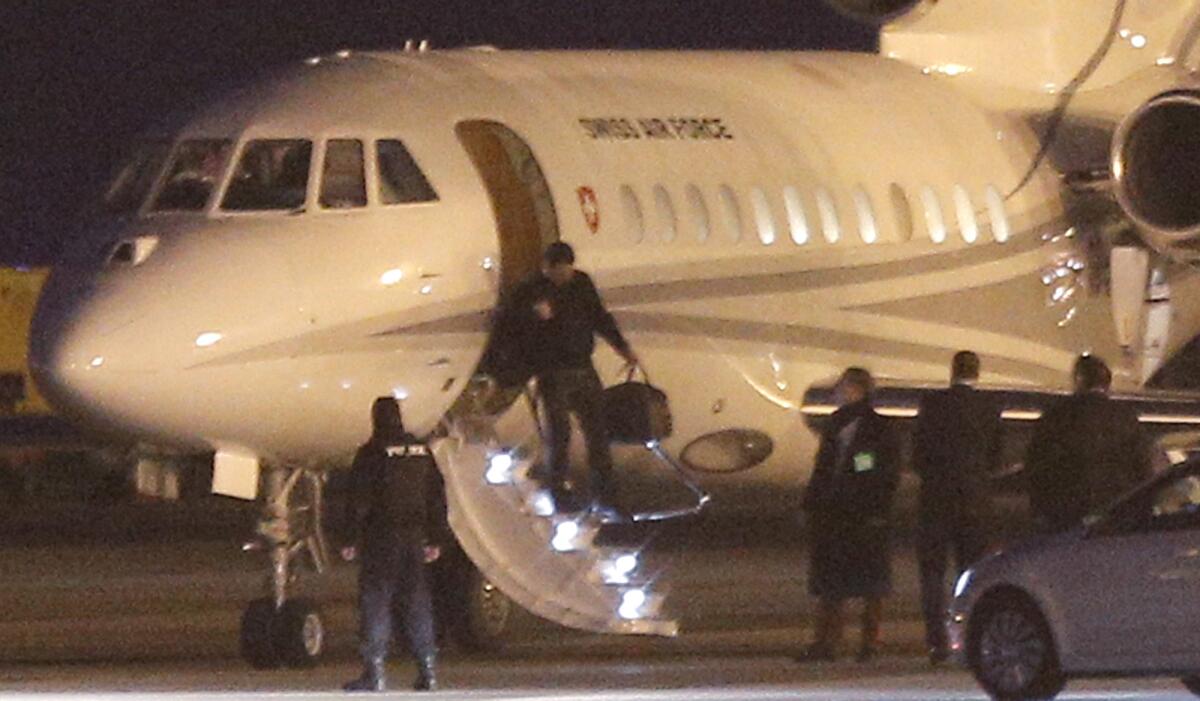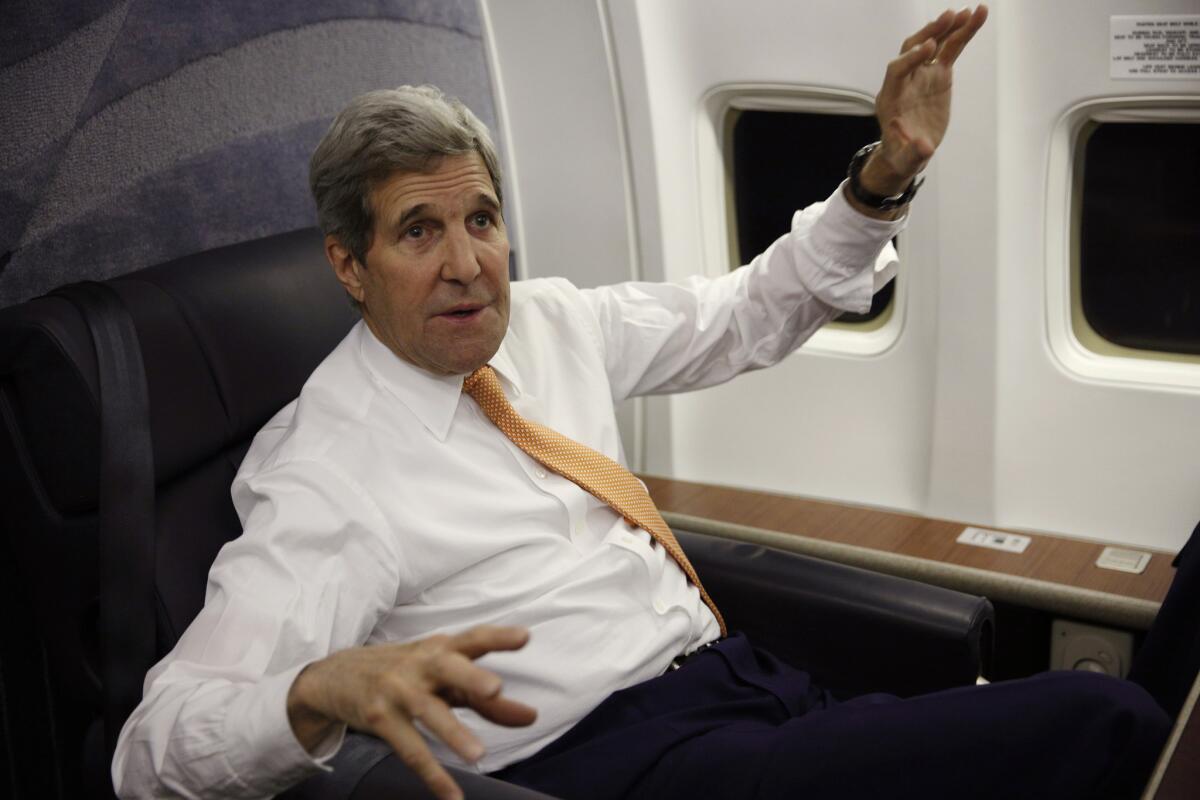As improved U.S.-Iran relations are celebrated, questions loom about the road ahead

An unidentified man leaves a Swiss air force Dassault Falcon at the airport in Geneva on Sunday, as a U.S. government plane waited nearby for the men who were released from imprisonment in Iran the day before.
Reporting from Washington — Amid celebration of the milestone nuclear deal and the departure from Iran of three freed Americans, the Obama administration offered a reminder Sunday of the gulf that remains in the countries’ relations.
The U.S. placed new sanctions targeting 11 people or companies that work to advance Iran’s ballistic missile system, and President Obama promised to “remain vigilant.”
That announcement came almost as an aside in an otherwise upbeat message but illustrated the continued strains in what is being hailed as a new relationship between enemies Iran and the United States.
Addressing their respective nations, Obama and his Iranian counterpart, Hassan Rouhani, praised the nuclear deal as a victory for tough diplomacy between two governments that just a short time ago were not on speaking terms.
Obama said the deal, fully implemented on Saturday, makes the world safer, allows Iran to join the world by lifting key sanctions, and is already providing sidebar dividends: the release of five Americans who were being held in Iranian jails and were “finally coming home.”
Three of them touched down on U.S. territory Sunday, albeit in an American military base at Ramstein, Germany. The Swiss jet carrying Washington Post reporter Jason Rezaian and the others landed Sunday evening at the base, where the freed men will undergo medical checks.
See the most-read stories this hour >>
Along with Rezaian, the other two were U.S. Marine veteran Amir Hekmati and Christian pastor Saeed Abedini. Also on board were Rezaian’s Iranian wife and his mother; finding them in Tehran on Saturday delayed the departure of the flight.
A fourth Iranian-American, Nosratollah Khosravi-Roodsari, about whom little is known, chose to stay in Iran, U.S. officials said, adding that it was his right. The fifth, student Matthew Trevithick, who was in Iran studying Persian, left earlier.
Except for Trevithick, the prisoners were released in an exchange for seven Iranians who were jailed or facing trial in the U.S. They were charged with violating sanctions by attempting to illegally export prohibited items and will be granted clemency by Obama. They were on a much longer list the Iranians supplied but that was whittled down to include only those who hadn’t committed violent or terrorism-related crimes, U.S. officials said.

U.S. Secretary of State John Kerry speaks to journalists about his negotiations with Iran upon his arrival from Vienna at Joint Base Andrews in Washington, D.C.
Obama said the nuclear deal, under which Iran has dismantled much of its nuclear arms capabilities and been rewarded with the easing of significant economic sanctions, serves as a reminder “of what we can achieve when we lead with strength and wisdom.”
And he told the Iranian people that they will be able to emerge from dark days of isolation. Iran will receive tens of billions of dollars in frozen assets as well as access to the international banking system and world markets for its oil and gas.
“We’ve now closed off every single path Iran had to building a [nuclear] bomb,” Obama said from the White House. “We’ve achieved this historic progress through diplomacy, without resorting to another war in the Middle East.”
In Tehran, before parliament, Rouhani lauded a “golden page” in the Islamic Republic’s history that will be the beginning of economic recovery thanks to the injection of cash and trade.
“While we always remain ready to defend Iran, we bear the message of peace, stability and security for our region and the world,” he later tweeted.
NEWSLETTER: Get the day’s top headlines from Times Editor Davan Maharaj >>
Iranian officials are hopeful that the lifting of sanctions will help revive the nation’s economy, crippled by the sanctions in recent years, but the low price of oil means Iran’s immediate income will be lower than needed or expected.
Obama also announced the resolution of a long-standing claim Iran had brought in the Iran-U.S. Claims Tribunal in The Hague, the international court through which such demands were pursued.
Dating to shortly after the 1979 Islamic Revolution, Iran said it was owed $400 million for military equipment the deposed government was buying. In the resolution, the U.S. paid the $400 million plus $1.3 billion in interest, which was much less than what the Iranians had sought, Obama said.
Within the framework of the nuclear negotiations, a less hostile relationship developed between the U.S. and Iran following decades of acrimony, especially through the personal contacts of Secretary of State John F. Kerry and his Iranian counterpart, Mohammad Javad Zarif. Many hope that can be translated into cooperation on other persistent conflicts in the region, such as the civil war in Syria.
American officials are also hopeful that the success of the nuclear deal will strengthen the hands of Rouhani and other like-minded moderate Iranians.
The tone of Iran’s rhetoric “very much changed when Rouhani was elected,” an administration official said. “He had a mandate to engage the West on the nuclear issues.”
Yet it is clear that change comes slowly in Iran, and discord between the two countries remains deep.
The ballistic missile sanctions, for instance, had been prepared weeks ago but held up until the prisoners were freed. Among the targets are a network based in the Middle East and China and another with suspected links to North Korea, as well as five Iranians who U.S. officials said had worked to secure ballistic weapon components.
“Iran’s ballistic missile program poses a significant threat to regional and global security, and it will continue to be subject to international sanctions,” Adam Szubin, the Treasury Department’s undersecretary for terrorism and financial intelligence, said in a statement Sunday.
The sanctions include a freeze of any assets that these entities and individuals have in the U.S. financial system, as well as prohibitions on doing business with them.
The sanctions are separate from those against the nuclear program that were lifted this weekend. Iran launched ballistic missiles on two occasions last year in violation of the U.N. restrictions; Iran says it has a right to use the weapons.
Other U.S. sanctions that remain in place on Iran include those related to activities considered by Washington to be terrorism and violations of human rights. Obama and other U.S. officials insist they can revive other sanctions at any point if Iran is found to be in violation of nuclear restrictions or any other sanctionable activities.
In swapping the prisoners, the Obama administration has come under criticism among Republicans and others for appearing to exchange innocents for convicted criminals. But administration officials Sunday defended the swap, saying it was a one-time, unusual opportunity that they saw arise on the margins of the nuclear talks.
At the start of the discussions over the prisoners, Iran asked the U.S. to release many more Iranians than the seven who were ultimately freed from U.S. custody. Over 14 months of talks, usually held in Switzerland, U.S. officials said, they were able to narrow the group to those who’d committed or were accused of nonviolent sanctions violations.
“It became possible to see a way to get the American citizens home,” said one senior administration official, who would not be named discussing the private talks.
Officials acknowledged it was a calculated risk.
“Do you want to leave these Americans in prison at great risk to themselves and great hardships to their families? This was our opportunity to bring them home,” he said. “We also did not have to release any Iranians involved in terrorism or violent crimes.”
The officials said the search will continue for Robert Levinson, a retired FBI agent working on an unauthorized CIA mission in Iran, who disappeared in 2007. He has not been found, and Kerry has said the U.S. has no idea where he is.
Wilkinson reported from Washington and McDonnell from Beirut. Times staff writer Don Lee in Washington contributed to this report.
ALSO
Once again, Islamic State suspected of carrying out mass kidnapping
Burkina Faso siege leaves at least 28 dead, including an American
Taiwan nationalists suffer historic defeat with election of first female president
More to Read
Sign up for Essential California
The most important California stories and recommendations in your inbox every morning.
You may occasionally receive promotional content from the Los Angeles Times.











